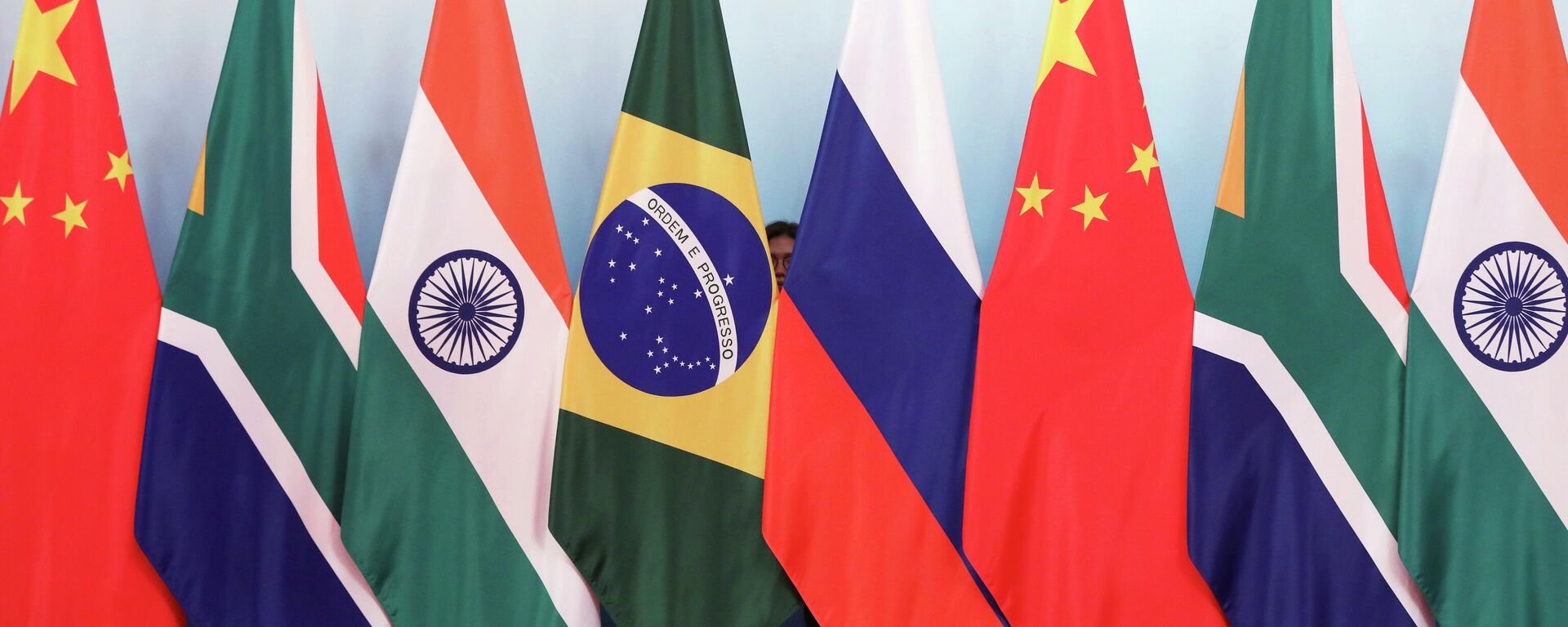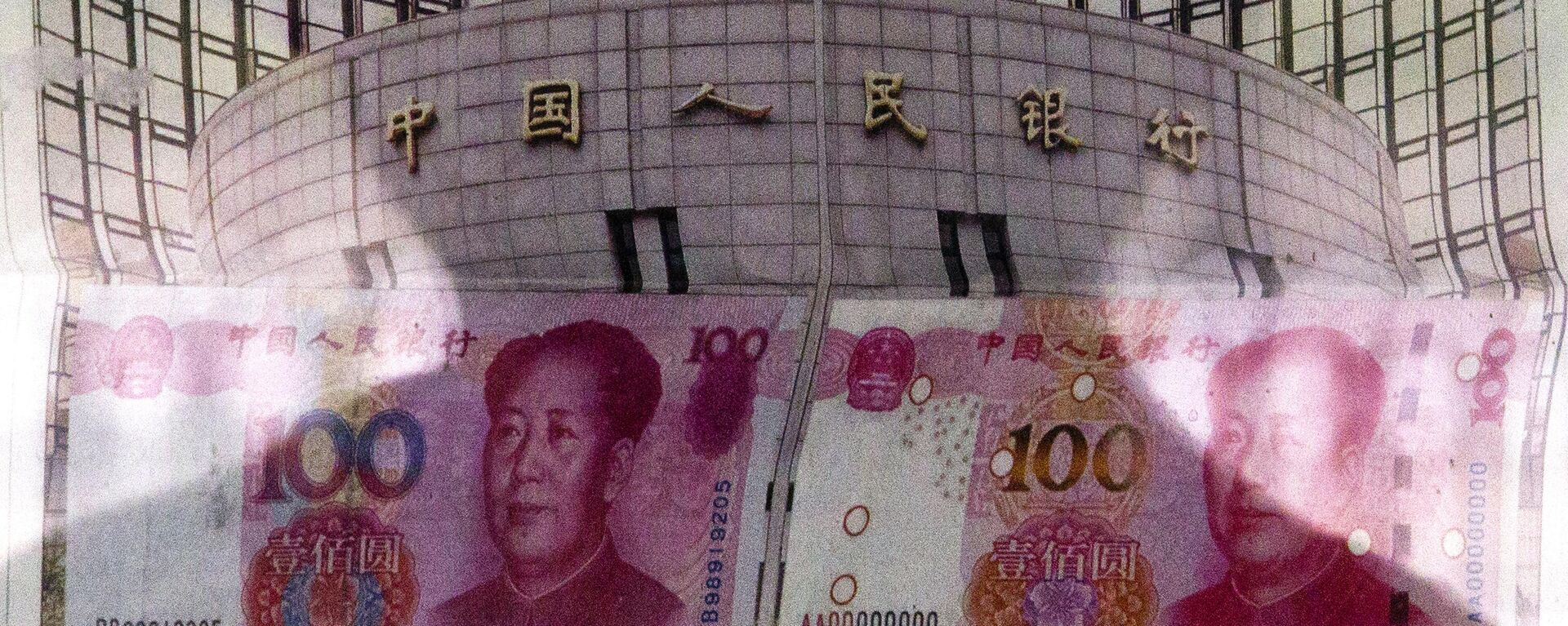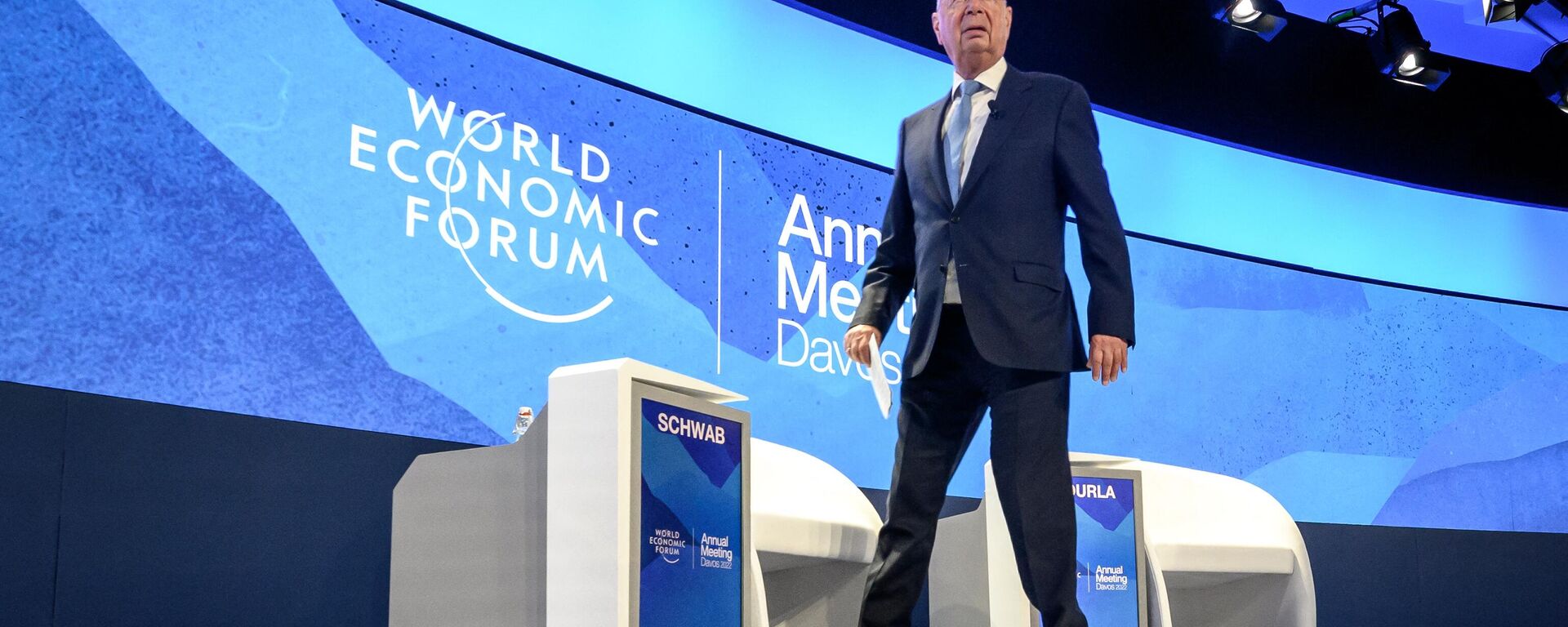https://sputnikglobe.com/20230128/new-currency-zones-taking-shape-within-brics-as-global-dollar-system-crumbling-economist-says-1106787680.html
New Currency Zones Taking Shape Within BRICS as Global Dollar System Crumbling, Economist Says
New Currency Zones Taking Shape Within BRICS as Global Dollar System Crumbling, Economist Says
Sputnik International
On January 25, Russian Foreign Minister Sergey Lavrov told journalists in Angola that BRICS, an acronym for Brazil, Russia, India, China, and South Africa, may soon explore the possibility of creating its own currency. What message does this plan send regarding the greenback's dominance?
2023-01-28T13:38+0000
2023-01-28T13:38+0000
2023-05-03T16:09+0000
analysis
us
opinion
russia
latin america
europe
asia-pacific region
china
currency
world economy
https://cdn1.img.sputnikglobe.com/img/07e5/02/13/1082127479_0:67:1280:787_1920x0_80_0_0_6b060e6bb065c7d7c2840c120c305b08.jpg
While delivering a statement after his meeting with Angolan President Joao Lourenco, Russian Foreign Minister Sergey Lavrov emphasized that the West had shattered vital principles of the inviolability of property, the presumption of innocence, fair competition, and globalization.Under these circumstances, BRICS, an informal group of developing nations, and the CELAC (Community of Latin American and Caribbean States) have started to discuss the establishment of their own new currencies within the frameworks of these blocs, according to the Russian foreign minister.Earlier this week, President of Brazil Luiz Inacio Lula da Silva touched upon the issue of the creation of a common currency for BRICS and the countries of Mercosur, a South American trade bloc, during his meeting with his Argentine counterpart Alberto Fernandez.Lula da Silva specified that the countries could establish a type of currency for trade that the Central Bank sets. He added that he would prefer international trading transactions to always be settled in national currencies to reduce dependence on the US dollar.Last week, the two presidents wrote an op-ed signaling their willingness to advance the discussions on a common South African currency that "could be used for both financial and commercial flows, reducing the costs of operations and [the continent's] external vulnerability."Mikhail Khazin, a Russian economist, researcher, and publicist, has addressed seeming contradictions in Lula da Silva's statement. The Russian economist is inclined to believe that while BRICS and CELAC members are talking about a single currency system, they are likely to create a single payment system at the first stage.He expects that four new currency zones will be formed, comprising the Latin American, Eurasian, Chinese, and Indian regions. Only after that, in about 10 years, would it be logical to create a single currency, as a "superstructure," for all of them, akin to the euro, according to Khazin.Decline of Global US Dollar-Based SystemSo, what does the economist mean when he speaks about new "currency zones"? According to Khazin, the harbingers of the US dollar's decline started to emerge decades ago.20 years ago, Khazin and co-author Andrei Kobyakov wrote a book eloquently titled "The Decline of the Dollar Empire and the End of Pax Americana." The economists drew attention to the fact that today, the entire world financial system is built upon the dollar, in particular, all investments are made in dollars.However, the problem was that alternative investment currencies did not exist at the time. The authors explained that in order for investment currencies to appear, some additional requirements are needed."The main requirement is the following: it is necessary that these investments pay off," the publicist continued. "Small countries cannot invest in their currencies. Because they can make some kind of enterprise with their own money, but then this enterprise comes up against the fact that no one buys its products outside this country. And for this reason, investments do not pay off. That is, in other words, in order for investments to pay off (I mean in the economy as a whole, not a specific enterprise), big markets are needed."According to Khazin's estimates, the minimum market size should be around 500 million people. In accordance with this theory, the economists listed five or six potential currency zones: the US dollar zone; the euro zone; the ruble zone (or the Eurasian zone); the Chinese zone; the Indian zone; and the Latin American zone, which was also supposed to include South Africa."The euro zone already existed in 2003, the dollar zone naturally existed, and we figured that there are several countries that could become leaders in the other currency zones," Khazin noted. "We named five countries which could potentially become leaders in new currency zones. These were Russia, India, China, Brazil and South Africa. Six months later, these countries were united first into BRIC, and then South Africa (BRICS) was added to them."What New Currency Zone Can Emerge?The global dollar system began to crumble in 2008, as the Global financial crisis unfolded, according to Khazin. The economist argued that since 2008 the dollar-based system has not yet been fixed; instead, temporary measures have been taken by the West to keep it afloat.He assumed that the fuss surrounding the COVID pandemic was largely used by the US financial establishment to pin the whole blame on the coronavirus for the unfolding crisis. However, the problem has not gone away and the global investment process has largely stalled. Under these circumstances, the formation of new alternative currency zones has begun, according to the economist.The publicist suggested that as a result of this process, five currency zones could take shape:The only question was whether Latin America would step forward to create its own currency zone, the economist continued:"While Jair Bolsonaro was the president of Brazil that was impossible, because Bolsonaro kept Brazil in the United States' fold. However, when Lula da Silva won, he immediately began to talk about the creation of a Latin American currency zone."At the same time, the economist argued that the Eurozone is doomed, judging from the ongoing disintegration of its industrial base and the EU's apparent incapability of weathering upcoming perfect economic storms. Khazin expects the UK to rub more salt in the EU's wounds and facilitate the bloc's potential collapse in the future.In New Currency Zones, Countries Will Be Free to Choose Economic ModelThe world's new financial structure, comprising several currency zones, would be far more viable than the US dollar-based global system, according to Khazin."Profit in the dollar system was formed as a result of the redistribution of printed, emitted dollars. And in the new currency zones, profit should be arranged differently, and added value should be created there," the economist said.He noted that the investment process will be carried out in these new "zonal currencies" as the dollar investments in the global economy has considerably shrunk and will keep shrinking. Without investment, the economy cannot develop at all, because it is impossible to exist without the creation of new industries and new enterprises, according to the economist.It is still unclear what exact economic models would be developed in these new currency zones, according to the publicist.Speaking to Sputnik earlier this month, Konstantin Babkin, president of the Rosagromash Association and co-chair of Moscow Economic Forum (MEF), advocated "biodiversity" in economy and politics instead of Western-led globalization. The scholar argued that the existence of different economic models would facilitate the stability of the world's system, in the same way that the variety of ecosystems and species ensure the sustainability of nature.The Russian economic experts' comments come following the latest gathering of the 2023 Davos forum, which has long been regarded as a linchpin of the Western-centered globalization process. In the wake of the summit, a number of international observers concluded that the era of the dollar-based Western financial system's dominance is finally over.
https://sputnikglobe.com/20230125/lavrov-brics-mulling-own-currency-1106693342.html
https://sputnikglobe.com/20230124/lavrov-brics-working-to-boost-payments-in-national-currencies-as-dollar-unreliable-1106652210.html
https://sputnikglobe.com/20210324/dumping-the-dollar-will-china-russia-turkey-and-iran-create-a-new-international-currency-1082437606.html
https://sputnikglobe.com/20230121/globalization-has-died-and-davos-2023-was-its-funeral-ceremony-scholars-sum-up-1106556837.html
russia
china
Sputnik International
feedback@sputniknews.com
+74956456601
MIA „Rossiya Segodnya“
2023
News
en_EN
Sputnik International
feedback@sputniknews.com
+74956456601
MIA „Rossiya Segodnya“
Sputnik International
feedback@sputniknews.com
+74956456601
MIA „Rossiya Segodnya“
brics currency, new currency zones, us dollar dominance, 2008 global financial crisis, covid-related economic slump, de-globalization, variety of economic models, what are main economic systems, western-centric order, new world order
brics currency, new currency zones, us dollar dominance, 2008 global financial crisis, covid-related economic slump, de-globalization, variety of economic models, what are main economic systems, western-centric order, new world order
New Currency Zones Taking Shape Within BRICS as Global Dollar System Crumbling, Economist Says
13:38 GMT 28.01.2023 (Updated: 16:09 GMT 03.05.2023) On January 25, Russian Foreign Minister Sergey Lavrov told journalists in Angola that BRICS, an acronym for Brazil, Russia, India, China, and South Africa, may soon explore the possibility of creating its own currency. What message does this plan send regarding the greenback's dominance?
While delivering a statement after his meeting with Angolan President Joao Lourenco, Russian Foreign Minister Sergey Lavrov emphasized that the West had shattered vital principles of the inviolability of property, the presumption of innocence, fair competition, and globalization.
Under these circumstances, BRICS, an informal group of developing nations, and the CELAC (Community of Latin American and Caribbean States) have started to discuss
the establishment of their own new currencies within the frameworks of these blocs, according to the Russian foreign minister.
Earlier this week, President of Brazil Luiz Inacio Lula da Silva touched upon the issue of the creation of a common currency for BRICS and the countries of Mercosur, a South American trade bloc, during his meeting with his Argentine counterpart Alberto Fernandez.
Lula da Silva specified that the countries could establish a type of currency for trade that the Central Bank sets. He added that he would prefer international trading transactions to always be settled in national currencies to reduce dependence on the US dollar. Last week, the two presidents wrote an op-ed signaling their willingness to advance the discussions on a common South African currency that "could be used for both financial and commercial flows, reducing the costs of operations and [the continent's] external vulnerability."
Mikhail Khazin, a Russian economist, researcher, and publicist, has addressed seeming contradictions in Lula da Silva's statement. The Russian economist is inclined to believe that while BRICS and CELAC members are talking about a single currency system, they are likely to create a single payment system at the first stage.
"It now makes sense to create a payment system that combines the currency systems of the Eurasian, Chinese, Indian and Latin American zones," Khazin told Sputnik. "It is necessary to create a payment system independent of the dollar."
He expects that four new currency zones will be formed, comprising the Latin American, Eurasian, Chinese, and Indian regions. Only after that, in about 10 years, would it be logical to create a single currency, as a "superstructure," for all of them, akin to the euro, according to Khazin.

25 January 2023, 14:51 GMT
Decline of Global US Dollar-Based System
So, what does the economist mean when he speaks about new "currency zones"? According to Khazin, the harbingers of the US dollar's decline started to emerge decades ago.
20 years ago, Khazin and co-author Andrei Kobyakov wrote a book eloquently titled "The Decline of the Dollar Empire and the End of Pax Americana." The economists drew attention to the fact that today, the entire world financial system is built upon the dollar, in particular, all investments are made in dollars.
"That is, the investment process is fundamentally dollar-based," Khazin said. "In this situation, any problems with the dollar will inevitably entail very serious problems in the global economy for a banal reason: because there won't be enough investment. We further wrote in the book that as the effectiveness of the world dollar system is falling, for this reason – whether someone likes it or not – it is absolutely necessary that the dollar be replaced by other investment currencies."
However, the problem was that alternative investment currencies did not exist at the time. The authors explained that in order for investment currencies to appear, some additional requirements are needed.

24 January 2023, 12:56 GMT
"The main requirement is the following: it is necessary that these investments pay off," the publicist continued. "Small countries cannot invest in their currencies. Because they can make some kind of enterprise with their own money, but then this enterprise comes up against the fact that no one buys its products outside this country. And for this reason, investments do not pay off. That is, in other words, in order for investments to pay off (I mean in the economy as a whole, not a specific enterprise), big markets are needed."
According to Khazin's estimates, the minimum market size should be around 500 million people. In accordance with this theory, the economists listed five or six potential currency zones: the US dollar zone; the euro zone; the ruble zone (or the Eurasian zone); the Chinese zone; the Indian zone; and the Latin American zone, which was also supposed to include South Africa.
"The euro zone already existed in 2003, the dollar zone naturally existed, and we figured that there are several countries that could become leaders in the other currency zones," Khazin noted. "We named five countries which could potentially become leaders in new currency zones. These were Russia, India, China, Brazil and South Africa. Six months later, these countries were united first into BRIC, and then South Africa (BRICS) was added to them."
What New Currency Zone Can Emerge?
The global dollar system began to crumble in 2008, as the Global financial crisis unfolded, according to Khazin. The economist argued that since 2008 the dollar-based system has not yet been fixed; instead, temporary measures have been taken by the West to keep it afloat.
He assumed that the fuss surrounding the COVID pandemic was largely used by the US financial establishment to pin the whole blame on the coronavirus for the unfolding crisis. However, the problem has not gone away and the global investment process has largely stalled. Under these circumstances, the formation of new alternative currency zones has begun, according to the economist.
The publicist suggested that as a result of this process, five currency zones could take shape:
"It is already more or less clear [what countries] the Eurasian zone will consist of: these are Russia and neighboring countries, Iran, Turkey and the states of the Arab world. There are roughly 550 million people there. It is also clear what the dollar zone will be: we can formally dub it 'AUKUS.' It will consist of the US, UK, Australia, Canada and New Zealand, totally comprising about 500 million people. Everything is clear with India, there are more than a billion people there, and China's zone also covers more than a billion people."
Mikhail Khazin
Russian economist, researcher, and publicist
The only question was whether Latin America would step forward to create its own currency zone, the economist continued:
"While Jair Bolsonaro was the president of Brazil that was impossible, because Bolsonaro kept Brazil in the United States' fold. However, when Lula da Silva won, he immediately began to talk about the creation of a Latin American currency zone."
At the same time, the economist argued that the Eurozone is doomed, judging from the ongoing disintegration of its industrial base and the EU's apparent incapability of weathering upcoming perfect economic storms. Khazin expects the UK to rub more salt in the EU's wounds and facilitate the bloc's potential collapse in the future.

21 January 2023, 14:55 GMT
In New Currency Zones, Countries Will Be Free to Choose Economic Model
The world's new financial structure, comprising several currency zones, would be far more viable than the US dollar-based global system, according to Khazin.
"Profit in the dollar system was formed as a result of the redistribution of printed, emitted dollars. And in the new currency zones, profit should be arranged differently, and added value should be created there," the economist said.
He noted that the investment process will be carried out in these new "zonal currencies" as the dollar investments in the global economy has considerably shrunk and will keep shrinking. Without investment, the economy cannot develop at all, because it is impossible to exist without the creation of new industries and new enterprises, according to the economist.
It is still unclear what exact economic models would be developed in these new currency zones, according to the publicist.
"There are many options for this. There are many different economic models ranging from a planned economy system to an 'absolutely free' market system. And theoretically, this can all be varied and there is no answer yet. That is, there is some freedom that can be used in the sense that different countries can create optimal systems for themselves," Khazin emphasized.
Speaking to Sputnik earlier this month, Konstantin Babkin, president of the Rosagromash Association and co-chair of Moscow Economic Forum (MEF), advocated "biodiversity" in economy and politics instead of Western-led globalization. The scholar argued that the existence of different economic models would facilitate the stability of the world's system, in the same way that the variety of ecosystems and species ensure the sustainability of nature.
The Russian economic experts' comments come following the latest gathering of the 2023 Davos forum, which has long been regarded as a linchpin of the Western-centered globalization process. In the wake of the summit, a number of international observers concluded that
the era of the dollar-based Western financial system's dominance is finally over.






